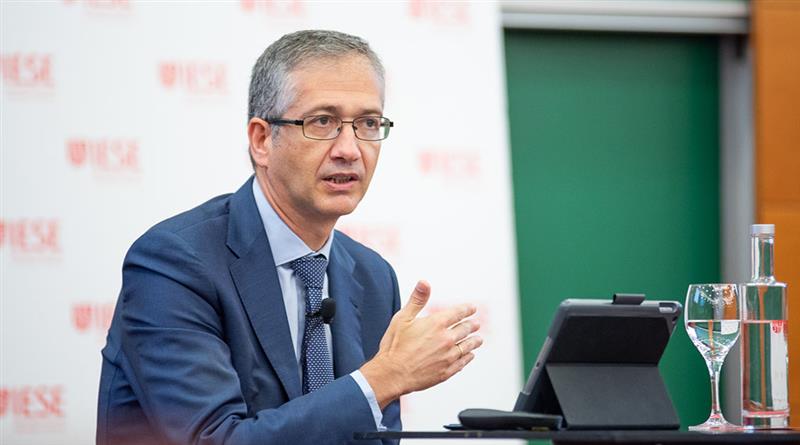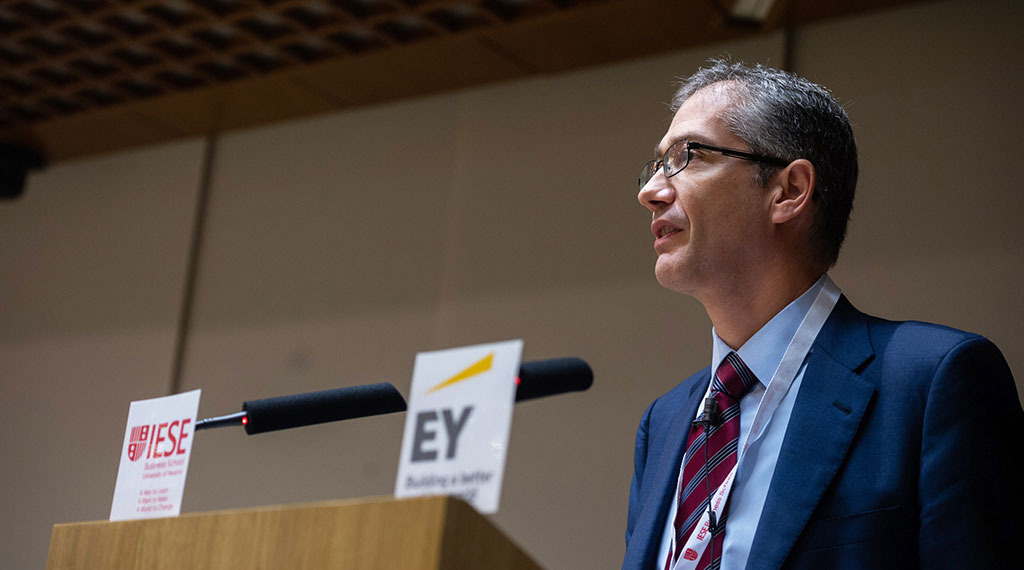Stories
European Central Bank doesn’t foresee early interest rate hike
Bank of Spain’s Hernández de Cos explains new monetary policy strategy
Bank of Spain Governor Pablo Hernández de Cos speaks at IESE.
Photo: Edu Ferrer
September 17, 2021

Armed with a new strategy on monetary policy, the European Central Bank (ECB) is ready and able to raise interest rates to ensure price stability – but the conditions to hike rates have clearly not been met, Bank of Spain Governor Pablo Hernández de Cos said.
Hernández de Cos was speaking at IESE’s Barcelona campus about the ECB’s new monetary strategy approved in July, which, among other measures, includes an inflation target of 2%. In order to touch interest rates, inflation would have to reach 2% well before expected, be forecast to stay at that level over time, and underlying inflation would already have to have reached the target.
Asked about an FT report that the ECB would raise rates earlier than expected, in 2023, Hernández de Cos said that the three conditions are clearly not in place, even if inflation has recently increased in some areas. “These three conditions that I have mentioned, under current conditions, don’t allow us to anticipate that there will be an increase in 2023,” he said.
In addition to the 2% goal, the new strategy allows the ECB to take substantial and consistent actions, like it has done during the COVID-19 pandemic. “This can also mean that during a temporary period inflation will be moderately above the goal,” he said.
Hernández de Cos reiterated that the ECB remains fully committed to the pandemic emergency purchase program (PEPP), and that a recent decision to lower the size of purchases didn’t mean that it was tapering off. “This has absolutely nothing to do with the start of a process to progressively reduce the purchasing program,” he said.
Low productivity and high debt main challenges to Spain
Turning to the Spanish economy, Hernández said that he feels the two main challenges are low productivity levels and high public debt. “I think that one could sum up, I don’t know if all but a good part of the challenges of the Spanish economy with two factors: productivity on the one hand and public debt on the other.”
Concerns about the labor market – such as persistently high unemployment, short-term job positions and inadequate training – are linked to the productivity factor. Spain needs to work on its education system as well as invest more in technology, he said. The country needs to make it easier for companies to be founded, expanded and then dissolved if necessary.
The expanding public debt, which has increased sharply because of the pandemic, “puts our economy in a very vulnerable situation,” he said. Any change in market perception will make financing difficult, and Spain has little fiscal space to deal with future crises.
That said, he’s confident that the economy is firmly on the mend after its pandemic slump. “The recovery continues apace,” he said. He expects strong growth this year and next, and for GDP to reach pre-pandemic levels at the end of next year.
Hernández de Cos was also asked about a recent move in Spain to increase the minimum wage. He said that raising the minimum wage can have a variety of goals, and has been shown to help fight income inequality in some countries. But it can also have negative consequences. “What we know is that a moderate increase in the minimum wage probably generates moderately negative effects on employment,” especially in groups such as young people or older workers.
And it’s also a complicated time to take such a measure. “It’s true that the recovery is solid, but it’s also true that a characteristic of the recovery is that it’s quite heterogenous.”
The recovery is slower in the service sector and in small and medium-sized companies where an increase in the minimum wage will have a larger impact. “I think these are considerations we should take into account before making decisions, and they’re what prompt me to approach this issue with a certain prudence,” he added.
